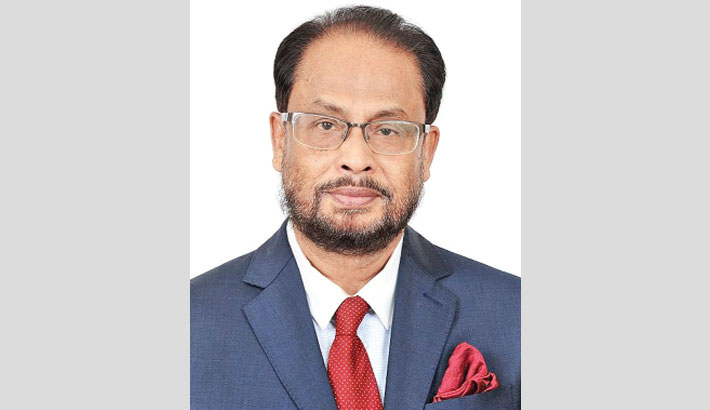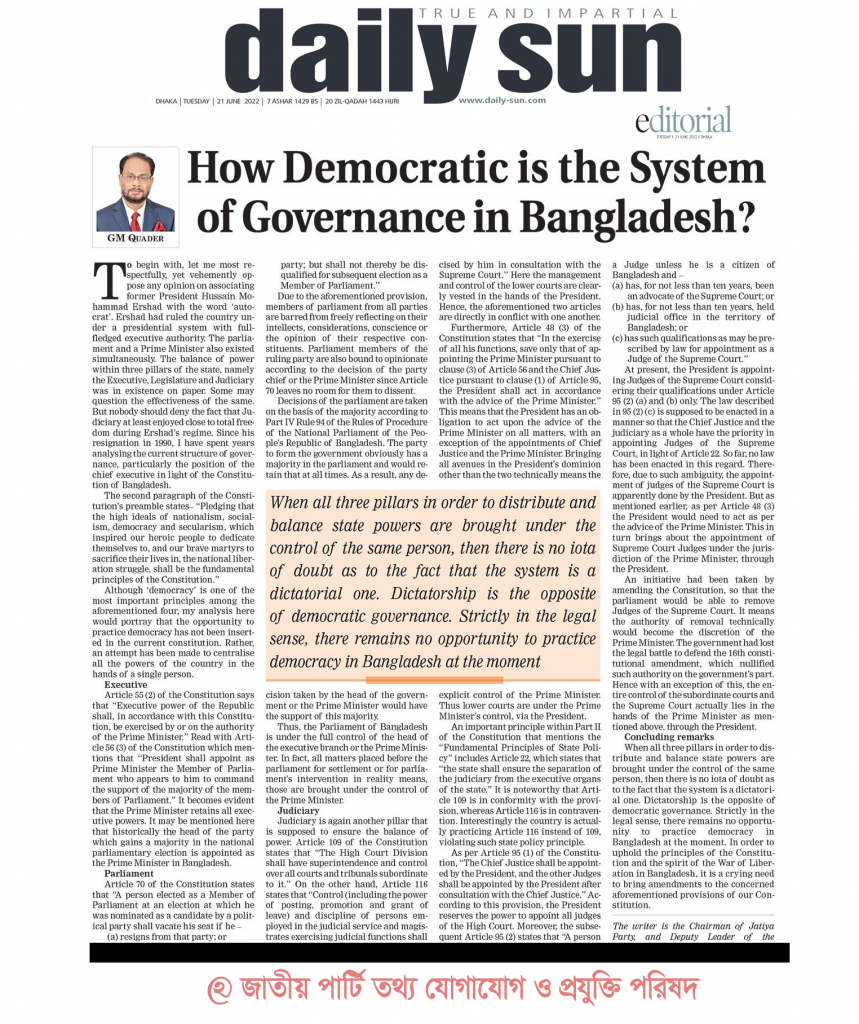
GM Quader
To begin with, let me most respectfully, yet vehemently oppose any opinion on associating former President Hussain Mohammad Ershad with the word ‘autocrat’. Ershad had ruled the country under a presidential system with full-fledged executive authority. The parliament and a Prime Minister also existed simultaneously. The balance of power within three pillars of the state, namely the Executive, Legislature and Judiciary was in existence on paper. Some may question the effectiveness of the same. But nobody should deny the fact that Judiciary at least enjoyed close to total freedom during Ershad’s regime. Since his resignation in 1990, I have spent years analysing the current structure of governance, particularly the position of the chief executive in light of the Constitution of Bangladesh.
The second paragraph of the Constitution’s preamble states– “Pledging that the high ideals of nationalism, socialism, democracy and secularism, which inspired our heroic people to dedicate themselves to, and our brave martyrs to sacrifice their lives in, the national liberation struggle, shall be the fundamental principles of the Constitution.”Although ‘democracy’ is one of the most important principles among the aforementioned four, my analysis here would portray that the opportunity to practice democracy has not been inserted in the current constitution. Rather, an attempt has been made to centralise all the powers of the country in the hands of a single person.
ExecutiveArticle 55 (2) of the Constitution says that “Executive power of the Republic shall, in accordance with this Constitution, be exercised by or on the authority of the Prime Minister.” Read with Article 56 (3) of the Constitution which mentions that “President shall appoint as Prime Minister the Member of Parliament who appears to him to command the support of the majority of the members of Parliament.” It becomes evident that the Prime Minister retains all executive powers. It may be mentioned here that historically the head of the party which gains a majority in the national parliamentary election is appointed as the Prime Minister in Bangladesh.
ParliamentArticle 70 of the Constitution states that “A person elected as a Member of Parliament at an election at which he was nominated as a candidate by a political party shall vacate his seat if he – (a) resigns from that party; or (b) votes in Parliament against that party; but shall not thereby be disqualified for subsequent election as a Member of Parliament.”Due to the aforementioned provision, members of parliament from all parties are barred from freely reflecting on their intellects, considerations, conscience or the opinion of their respective constituents. Parliament members of the ruling party are also bound to opinionate according to the decision of the party chief or the Prime Minister since Article 70 leaves no room for them to dissent.Decisions of the parliament are taken on the basis of the majority according to Part IV Rule 94 of the Rules of Procedure of the National Parliament of the People’s Republic of Bangladesh. The party to form the government obviously has a majority in the parliament and would retain that at all times. As a result, any decision taken by the head of the government or the Prime Minister would have the support of this majority.
Thus, the Parliament of Bangladesh is under the full control of the head of the executive branch or the Prime Minister. In fact, all matters placed before the parliament for settlement or for parliament’s intervention in reality means, those are brought under the control of the Prime Minister.
Judiciary
Judiciary is again another pillar that is supposed to ensure the balance of power. Article 109 of the Constitution states that “The High Court Division shall have superintendence and control over all courts and tribunals subordinate to it.” On the other hand, Article 116 states that “Control (including the power of posting, promotion and grant of leave) and discipline of persons employed in the judicial service and magistrates exercising judicial functions shall vest in the President and shall be exercised by him in consultation with the Supreme Court.” Here the management and control of the lower courts are clearly vested in the hands of the President. Hence, the aforementioned two articles are directly in conflict with one another.
Furthermore, Article 48 (3) of the Constitution states that “In the exercise of all his functions, save only that of appointing the Prime Minister pursuant to clause (3) of Article 56 and the Chief Justice pursuant to clause (1) of Article 95, the President shall act in accordance with the advice of the Prime Minister.” This means that the President has an obligation to act upon the advice of the Prime Minister on all matters, with an exception of the appointments of Chief Justice and the Prime Minister. Bringing all avenues in the President’s dominion other than the two technically means the explicit control of the Prime Minister. Thus lower courts are under the Prime Minister’s control, via the President.
An important principle within Part II of the Constitution that mentions the “Fundamental Principles of State Policy” includes Article 22, which states that “the state shall ensure the separation of the judiciary from the executive organs of the state.” It is noteworthy that Article 109 is in conformity with the provision, whereas Article 116 is in contravention. Interestingly the country is actually practicing Article 116 instead of 109, violating such state policy principle.
As per Article 95 (1) of the Constitution, “The Chief Justice shall be appointed by the President, and the other Judges shall be appointed by the President after consultation with the Chief Justice.” According to this provision, the President reserves the power to appoint all judges of the High Court. Moreover, the subsequent Article 95 (2) states that “A person shall not be qualified for appointment as a Judge unless he is a citizen of Bangladesh and –
(a) has, for not less than ten years, been an advocate of the Supreme Court; or
(b) has, for not less than ten years, held judicial office in the territory of Bangladesh; or
(c) has such qualifications as may be prescribed by law for appointment as a Judge of the Supreme Court.”
At present, the President is appointing Judges of the Supreme Court considering their qualifications under Article 95 (2) (a) and (b) only. The law described in 95 (2) (c) is supposed to be enacted in a manner so that the Chief Justice and the judiciary as a whole have the priority in appointing Judges of the Supreme Court, in light of Article 22. So far, no law has been enacted in this regard. Therefore, due to such ambiguity, the appointment of judges of the Supreme Court is apparently done by the President. But as mentioned earlier, as per Article 48 (3) the President would need to act as per the advice of the Prime Minister. This in turn brings about the appointment of Supreme Court Judges under the jurisdiction of the Prime Minister, through the President.
An initiative had been taken by amending the Constitution, so that the parliament would be able to remove Judges of the Supreme Court. It means the authority of removal technically would become the discretion of the Prime Minister. The government had lost the legal battle to defend the 16th constitutional amendment, which nullified such authority on the government’s part. Hence with an exception of this, the entire control of the subordinate courts and the Supreme Court actually lies in the hands of the Prime Minister as mentioned above, through the President.
Concluding remarks
When all three pillars in order to distribute and balance state powers are brought under the control of the same person, then there is no iota of doubt as to the fact that the system is a dictatorial one. Dictatorship is the opposite of democratic governance. Strictly in the legal sense, there remains no opportunity to practice democracy in Bangladesh at the moment. In order to uphold the principles of the Constitution and the spirit of the War of Liberation in Bangladesh, it is a crying need to bring amendments to the concerned aforementioned provisions of our Constitution.
The writer is the Chairman of JatiyaParty, and Deputy Leader of theopposition in Parliament
https://www.daily-sun.com/printversion/details/627565/How-Democratic-is-the-System-of-Governance-in-Bangladesh

